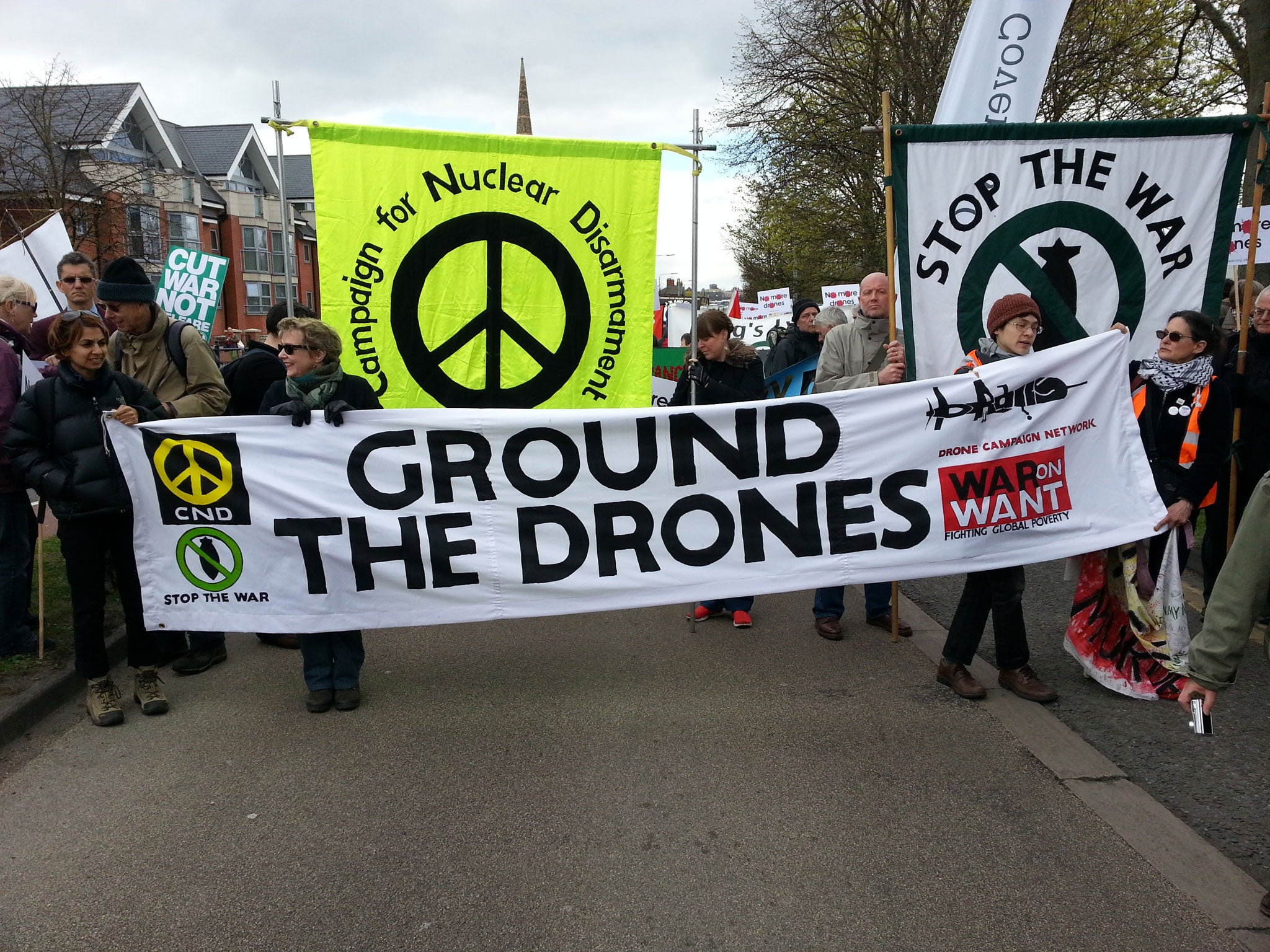Anger at UK's investment in 'risk-free' drone war
Protest march to RAF base – but it is revealed that new drones costing £2bn may soon be obsolete

Your support helps us to tell the story
From reproductive rights to climate change to Big Tech, The Independent is on the ground when the story is developing. Whether it's investigating the financials of Elon Musk's pro-Trump PAC or producing our latest documentary, 'The A Word', which shines a light on the American women fighting for reproductive rights, we know how important it is to parse out the facts from the messaging.
At such a critical moment in US history, we need reporters on the ground. Your donation allows us to keep sending journalists to speak to both sides of the story.
The Independent is trusted by Americans across the entire political spectrum. And unlike many other quality news outlets, we choose not to lock Americans out of our reporting and analysis with paywalls. We believe quality journalism should be available to everyone, paid for by those who can afford it.
Your support makes all the difference.Hundreds of anti-war campaigners descended on an RAF base in Lincolnshire yesterday demanding an end to Britain's development of heavily armed unmanned aircraft of the type that have killed terrorists, enemy forces and civilians around the world.
Protesters from groups including CND and the Stop the War Coalition gathered at RAF Waddington to warn of the dangers of "long-distance warfare", days after it emerged that aircrew at the base had begun remotely controlling drones flying thousands of miles away in Afghanistan. Previously, all unmanned aerial vehicle (UAV) missions over Afghanistan had been operated from Creech air force base in Nevada.
The Ministry of Defence insists that it does not use armed UAVs against terrorist suspects outside Afghanistan, and that the vast majority of UK drone flights are reconnaissance missions. But British drones within Afghanistan have deployed 350 weapons since 2007, including Hellfire guided missiles and laser-guided bombs.
The demonstration reflects growing concern over the UK's investment in "remote 'risk-free' warfare". Critics claim this makes it easier for politicians and military chiefs to launch air strikes from thousands of miles away that put civilians at risk.
The pressure group Drone Wars UK has warned MPs that the use of armed UAVs "is a perilous military escalation which endangers global peace and security".
In a submission to the defence select committee inquiry into the state of Britain's military establishment, published last week, the group stated: "Concerns... include whether armed UAVs are lowering the political costs of military intervention, expanding the use of targeted killing and creating international instability rather than security.... we [are concerned] about moves to develop autonomous unmanned systems as well as arming smaller surveillance UAVs."
Defence chiefs are researching a new generation of more powerful UAVs, amid fears that a £2bn upgrade in development may be obsolete by the time it is finally delivered.
The Scavenger programme – a fleet of 30 unmanned aircraft able to attack targets and carry out reconnaissance missions – is due to come into service later this decade. But officials admit that "some elements of the system will inevitably be obsolete on introduction to service and many others shortly thereafter".
Lord Bates, a Conservative, said: "The temptation to see a greater tactical use of drones in areas of the world where there is no political will to put the lives of British forces at risk or in the absence of an international mandate must be very great, and that is why an open debate is necessary."
Air Marshal Sir John Walker, a former chief of Defence Intelligence, said that "having a capability like the drones on the order of battle can only be a good thing" because they could help troops on the ground who are in trouble, if necessary.
But Chris Nineham, vice-chairman of the Stop the War Coalition, said: "The technology that is being introduced is giving carte blanche to governments to fight wars behind the backs of people with no public scrutiny or accountability."
Thomas Nash, from the arms control group Article 36, said: "We are seeing a slide towards the greater autonomy of weapons. Full autonomy on the battlefield, where the power is given to a machine to decide who lives or dies, crosses a fundamental moral line. The UK says it will always keep human control over weapons and this is an important commitment. But unless they tell us what that means, we are at risk of sleepwalking into fully autonomous weapons."
A Ministry of Defence spokesman said: "UK Reaper aircraft are piloted by highly trained professional military pilots, who adhere strictly to the same laws of armed conflict and are bound by the same clearly defined rules of engagement that apply to traditionally manned RAF aircraft."
Join our commenting forum
Join thought-provoking conversations, follow other Independent readers and see their replies
Comments